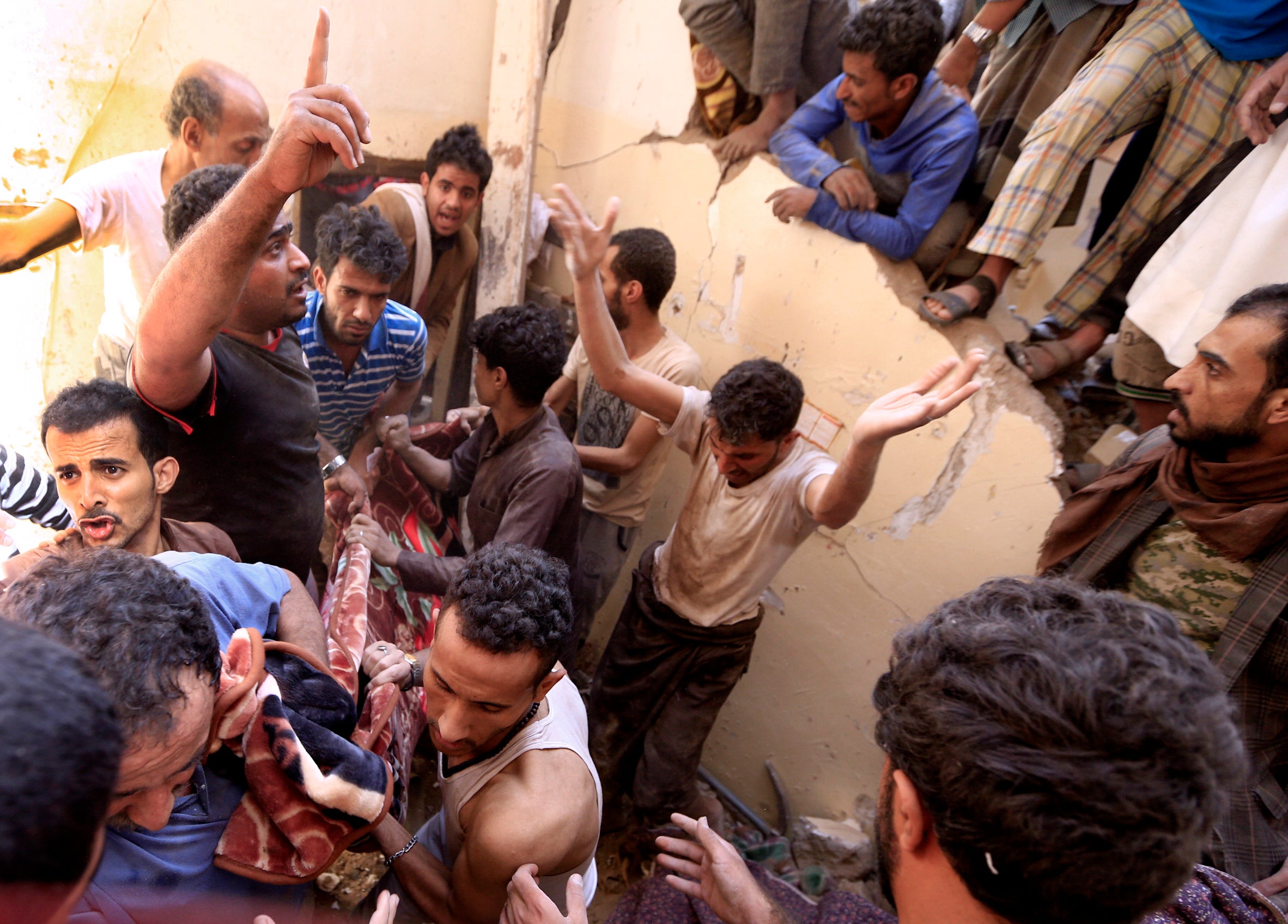Yemen: Gulf coalition pounds Sana’a after rebel drone strikes in Saudi, threatening fragile peace deal
At least six dead after Gulf alliance airstrikes pummel Sana’a, after Houthi drones hit Saudi oil facilities
Gulf coalition warplanes have pounded Yemen’s Houthi-held capital Sana’a after rebels struck Saudi oil installations, in a surge of violence that threatens to shatter a peace deal.
The Houthi health ministry said six civilians were killed and 60 wounded, including two Russian women working in the health sector.
Among the dead were as many as five children, a United Nations humanitarian coordinator added.
The strikes on Houthi targets in the capital were launched after the Iran-backed rebels claimed responsibility for an armed drone attack on two oil-pumping stations in Saudi Arabia two days earlier.
Residents in Sana’a shared photos of civilians dragging the limp bodies of children out of the rubble of a residential building. They later circulated an image of a little girl, who was believed to be the sole survivor of an airstrike that hit her home.
“There was an airstrike near us, in the middle of an area packed with residents between Hael and Raqas [streets],” Abdulrazaq Mohammed said.
“The explosion was so strong that stones were flying. This is the first time our house shakes so much.”
Other civilians in the city said they were shaken awake by the bombings.
The Saudi-led coalition told Saudi-owned Al Arabiya TV that their alliance struck military facilities and weapons storage sites, “neutralising the ability of the Houthi militia to carry out acts of aggression”.
The coalition added: “The sorties achieved its goals with full precision,” and said it had urged civilians to avoid those targets.

In a later statement the coalition said “the possibility of an accident” had been referred to a body it had set up to investigate claims.
The Iran-backed rebels have held Sana’a since taking control of the city at the end of 2014 and forcing recognised president Abedrabbo Mansour Hadi from power.
Saudi Arabia, the UAE and its Gulf allies launched a bombing campaign in the spring of 2015 to reinstate Mr Hadi, triggering the devastating civil war.
Four years on there is little hope of an end to the fighting, which has sparked what the UN has called the world’s worst humanitarian crisis and pushed more than 13 million to the brink of famine.
A preliminary ceasefire deal was hammered out during talks held in Sweden in December, anchored on the withdrawal of all troops from the lifeline city of Hodeidah, that had become the front line of the conflict.
Under the agreement the Red Sea port, Yemen’s main channel for food and aid, would be handed over to a civil authority.
Five months on, the withdrawal tentatively has begun, with the Houthis saying last week they had unilaterally pulled out of Hodeidah and two other ports after Gulf-backed government troops refused to.
The Yemen authorities later accused the Houthis of merely handing over the port to fighters dressed in coastguard uniforms. On Wednesday, fighting erupted in the city once more between the two sides.
Talks were held in the Jordanian capital Amman the following day, but the warring sides failed to agree on how to manage revenues from Hodeidah.
Tensions reached breaking point on Tuesday after an armed drone attack on two Saudi oil-pumping stations. Saudi Arabia’s deputy defence minister accused Iran of ordering the attack.
“The terrorist acts, ordered by the regime in Tehran and carried out by the Houthis, are tightening the noose around the ongoing political efforts,” Prince Khalid bin Salman tweeted.
The Houthis later claimed responsibility and denied Iran had directed the strike. Tehran also denies providing arms to the Houthis.
“We are not agents for anyone,” Mohammed Ali al-Houthi, the head of the Houthis’ Supreme Revolutionary Committee, said.
“We make decisions independently and do not take orders for drones or anything else.”
The coalition described the drone attack as a “war crime”.
Iran condemned the airstrikes over Sana’a and called on international and human rights bodies “to act according to their responsibility to prevent the repetition of these crimes”, the state news agency IRNA reported.
Join our commenting forum
Join thought-provoking conversations, follow other Independent readers and see their replies
Comments
Bookmark popover
Removed from bookmarks